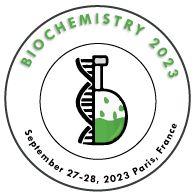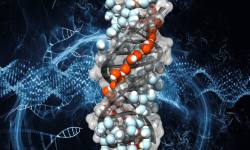Computational Chemistry and Chemical Biology
Computational chemists develop and apply computer programs to answer key questions in biochemistry. They model, predict, visualize, and analyze the structures, functions, and interactions of biologically important molecules. Computational chemistry is a branch of chemistry that uses computer simulation to assist in solving chemical problems. It uses methods of theoretical chemistry, incorporated into efficient computer programs, to calculate the structures and properties of molecules and solids. Biochemistry is the study of the chemistry of biology. It encompasses topics such as understanding how proteins are translated and peptide bonds formed, how macromolecular interactions occur, how the cell makes metabolites, etc.
- Molecular mechanics
- Chemical approaches to stem-cell biology
- Metal complexes in medicine
- Bioorganic and Bioinorganic Chemistry
- Genome Analysis
- Chemical and Molecular dynamics
- Applications of Chemical Biology in Drug Discovery
Related Conference of Computational Chemistry and Chemical Biology
Computational Chemistry and Chemical Biology Conference Speakers
Recommended Sessions
- Animal and Plant Biochemistry
- Cardiac Biochemistry
- Cellular and Molecular Biology
- Clinical and Nutritional Biochemistry
- Clinical Pathology
- Computational Chemistry and Chemical Biology
- Enzymology & Biochemistry
- Enzymology in Molecular Biology
- Lipids and Metabolism
- Medical Genetics
- Medicinal and Pharmaceutical Biochemistry
- Nano Biochemistry
- Protein and Analytical Biochemistry
- Proteomics in Biochemistry and Molecular Biology
- Structural and Molecular Biochemistry
- Structural Bioinformatics and Structural Molecular Biology
- Structural Biology
- Toxicology and Pharmacology
Related Journals
Are you interested in
- 3D Structure Determination - Structural Biology-2026 (France)
- Advanced Techniques in Structural Biology - Structural Biology-2026 (France)
- AI & Computational Structural Biology - Structural Biology-2026 (France)
- Biochemistry and Biophysics - Structural Biology-2026 (France)
- Computational Approach in Structural Biology - Structural Biology-2026 (France)
- Drug Designing and Biomarkers - Structural Biology-2026 (France)
- Hybrid Approaches for Structure Prediction - Structural Biology-2026 (France)
- Membrane Proteins and Receptors - Structural Biology-2026 (France)
- Molecular Modelling and Dynamics - Structural Biology-2026 (France)
- Proteomics and Genomics - Structural Biology-2026 (France)
- Structural Bioinformatics and Computational Biology - Structural Biology-2026 (France)
- Structural Biology in Cancer Research - Structural Biology-2026 (France)
- Structural Virology - Structural Biology-2026 (France)
- Structural Virology and Infectious Diseases - Structural Biology-2026 (France)
- Structure-Based Drug Discovery - Structural Biology-2026 (France)
- Structure-Based Solutions to Global Health Challenges - Structural Biology-2026 (France)
- Structure-Function Relationships - Structural Biology-2026 (France)
- The Structural Basis of Disease - Structural Biology-2026 (France)


